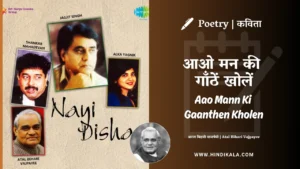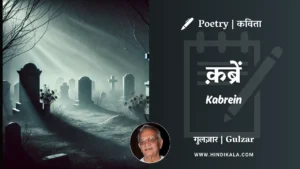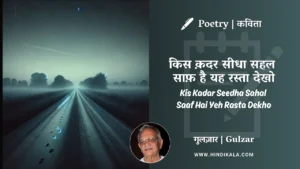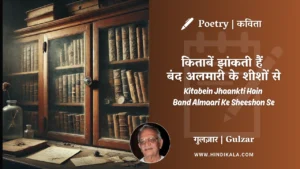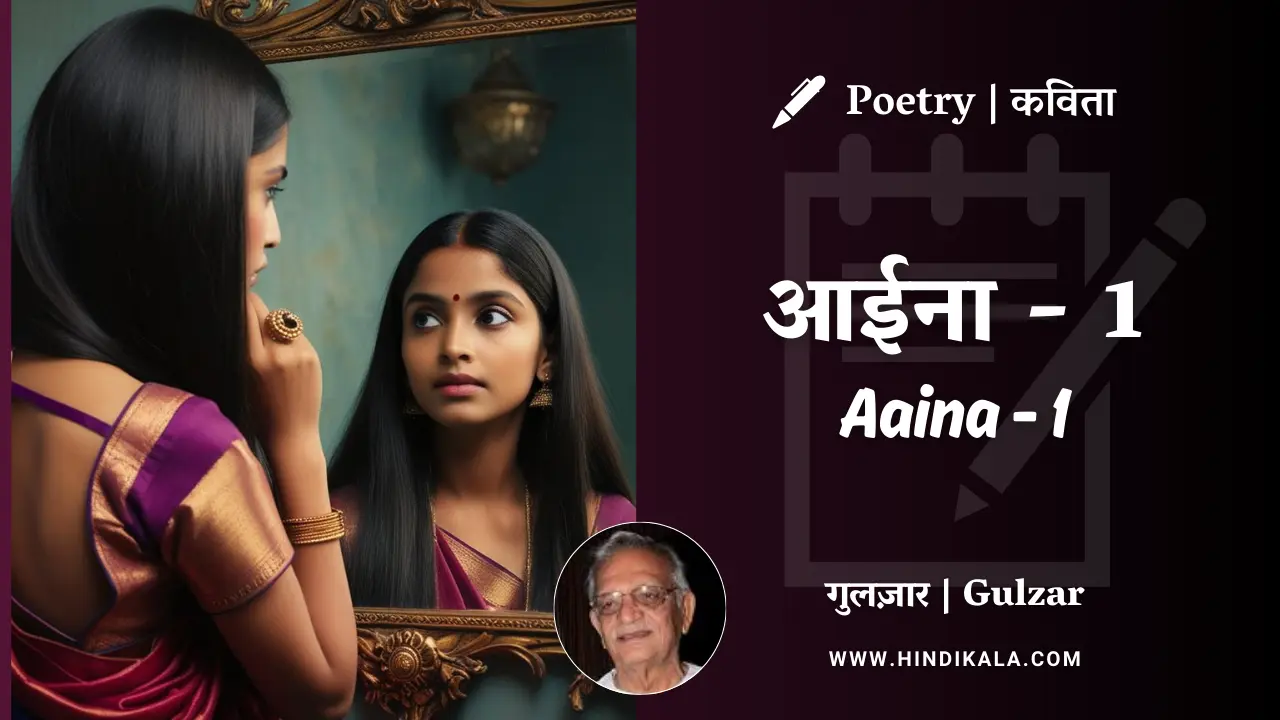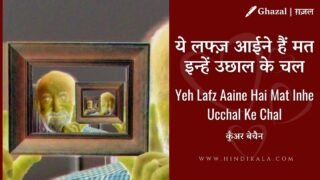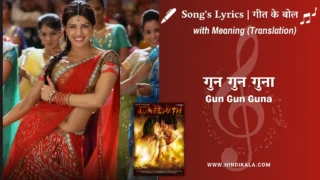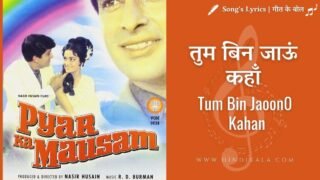Gulzar Poetry Kitabein Jhaankti Hain Band Almaari Ke Sheeshon Se in Hindi & English with Meaning (English Translation) | गुलज़ार – किताबें झांकती हैं बंद अलमारी के शीशों से
Hindi Kala presents Gulzar Poetry Kitabein Jhaankti Hain Band Almaari Ke Sheeshon Se about books in Hindi & English with the poem’s Meaning (English Translation).
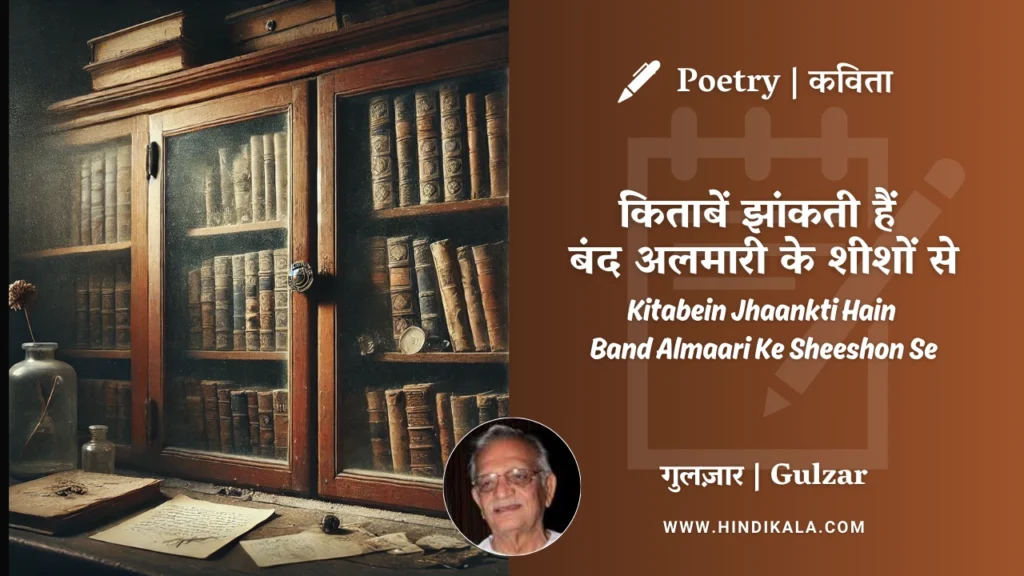
गुलज़ार की कविता किताबें
किताबें झांकती हैं बंद अलमारी के शीशों से
बड़ी हसरत से तकती हैं
महीनों अब मुलाकातें नहीं होती
जो शामें इनकी सोहबतों में कटा करती थीं,
अब अक्सर
गुज़र जाती हैं ‘कम्प्यूटर’ के पर्दों पर
बड़ी बेचैन रहती हैं किताबें..
इन्हें अब नींद में चलने की आदत हो गई हैं,
बड़ी हसरत से तकती हैं,
जो क़दरें वो सुनाती थीं।
कि जिनके ‘सैल’कभी मरते नहीं थे
वो क़दरें अब नज़र आती नहीं घर में
जो रिश्ते वो सुनती थीं
वह सारे उधरे-उधरे हैं
कोई सफ़्हा पलटता हूँ तो इक सिसकी निकलती है
कई लफ्ज़ों के माने गिर पड़ते हैं
बिना पत्तों के सूखे टुंडे लगते हैं वो सब अल्फाज़
जिन पर अब कोई माने नहीं उगते
बहुत सी इसतलाहें हैं
जो मिट्टी के सिकूरों की तरह बिखरी पड़ी हैं
गिलासों ने उन्हें मतरूक कर डाला
ज़ुबान पर ज़ायका आता था जो सफ़हे पलटने का
अब ऊँगली ‘क्लिक’करने से अब
झपकी गुज़रती है
बहुत कुछ तह-ब-तह खुलता चला जाता है परदे पर
किताबों से जो ज़ाती राब्ता था,कट गया है
कभी सीने पे रख के लेट जाते थे
Ìकभी गोदी में लेते थे,
कभी घुटनों को अपने रिहल की सुरत बना कर
नीम सज़दे में पढ़ा करते थे,छूते थे जबीं से
वो सारा इल्म तो मिलता रहेगा बाद में भी
मगर वो जो किताबों में मिला करते थे सूखे फूल
और महके हुए रुक्के
किताबें मांगने,गिरने,उठाने के बहाने रिश्ते बनते थे
उनका क्या होगा?
वो शायद अब नहीं होंगे!
Gulzar Ki Kavita Kitabein Jhaankti Hain Band Almaari Ke Sheeshon Se in Roman Transcript
Kitabein Jhaankti Hain Band Almaari Ke Sheeshon Se
Badi Hasrat Se Takti Hain
Mahinon Ab Mulaaqaatein Nahi Hoti
Jo Shaamein Inki Sohbatoon Mein Kata Karti Thi,
Ab Aksar
Guzar Jaati Hain ‘computer’ Ke Pardon Par
Badi Bechain Rehti Hain Kitaabein..
Inhe Ab Neend Mein Chalne Ki Aadat Ho Gayi Hai,
Badi Hasrat Se Takti Hain,
Jo Qadrein Wo Sunaati Thi
Ki Jin Ke ‘cell’ Kabhi Marte Nahi The
Wo Qadrein Ab Nazar Aati Nahi Ghar Mein
Jo Rishte Wo Sunti Thi
Woh Saare Udhre-Udhre Hain
Koi Safha Palta Hoon To Ek Siskhi Nikalti Hai
Kai Lafzon Ke Maane Gir Padte Hain
Bina Patton Ke Sookhe Tunde Lagte Hain Wo Sab Alfaaz
Jin Par Ab Koi Maane Nahi Ugte
Bahut Si Istilaahein Hain
Jo Mitti Ke Sikuron Ki Tarah Bikhri Padi Hain
Gilaason Ne Unhe Matrook Kar Daala
Zubaan Par Zayaka Aata Tha Jo Safhe Palatne Ka
Ab Ungli ‘click’ Karne Se Ab
Jhapki Guzarti Hai
Bahut Kuch Tah-Ba-Tah Khulta Chala Jaata Hai Parde Par
Kitaabon Se Jo Zaati Raabta Tha, Kat Gaya Hai
Kabhi Seene Pe Rakh Ke Let Jaate The
Ķabhi Godi Mein Lete The,
Kabhi Ghutnon Ko Apne Rihal Ki Surat Bana Kar
Neem Sajde Mein Padha Karte The, Chhute The Jabeen Se
Wo Saara Ilm To Milta Rahega Baad Mein Bhi
Magar Wo Jo Kitaabon Mein Mila Karte The Sookhe Phool
Aur Mahke Hue Rukkhe
Kitaabein Maangne, Girne, Uthane Ke Bahaane Rishte Bante The
Unka Kya Hoga?
Wo Shayad Ab Nahi Honge!
Gulzar Hindi Poetry Kitabein Jhaankti Hain Band Almaari Ke Sheeshon Se Meaning (English Translation)
Books peep through the closed glass doors of the cupboard
They look with great longing
Months have passed since we last met
Those evenings spent in their company
Now often pass
On computer screens
The books are very restless..
They have now gotten used to walking in their sleep,
They look with great longing,
At the values they used to convey.
Whose ‘cells’ never died
Those values are not visible in the house now
The relationships they used to narrate
All of them are scattered
When I turn a page, a sigh escapes
The meanings of many words have fallen
Those words seem like dry trunks without leaves
On which no meaning grows now
There are many idioms
Scattered like grains of sand
Glasses have discarded them
The taste of turning a page was on the tongue
Now with a click of the finger
A moment passes
Much is revealed layer by layer on the screen
The intimate connection with books has been severed
We used to lie down with them on our chests
Sometimes hold them in our laps,
Sometimes make our knees into a makeshift lectern
And read in a half-prostration, touching our foreheads
All that knowledge will continue to be available in the future
But those dried flowers and fragrant bookmarks we found in books
The relationships that were formed on the pretext of asking for, dropping, and picking up books
What will happen to them?
They probably won’t be there now!
Essence of the Poem
This poem, “Kitaaben jhaankti hain band almaari ke sheeshon se” (Books peek through the closed glass doors of the cupboard) by Gulzar, is a poignant reflection on the changing nature of reading and the diminishing connection between humans and books in the digital age.
Key Themes:
Nostalgia for the past: The poem makes one long for a time when people read books in person and treasured them as objects, when they had a closer relationship with them.
The shift to digital reading: The poem emphasizes how the tactile experience of reading has been lost as a result of the transition from physical books to digital formats.
The changing nature of relationships: The metaphor of books as companions suggests that the relationship between humans and books has changed, becoming more distant and less personal.
The loss of values and traditions: The poem suggests a loss of knowledge that was previously passed down through the generations as well as traditional values.
Interpretation:
A sense of loss and yearning for a more innocent era when books were more than just objects are conveyed in the poem. Their desire for human contact is implied by the image of books “peeping” through the cupboard doors. The poet emphasizes how special it is to hold a real book, turn the pages, and feel the paper’s texture. In the digital age, reading has become a more impersonal experience, losing this physical connection.
As the speaker recalls a time when books played a major role in their lives, the poem also touches on the theme of nostalgia. It is believed that losing this connection is equivalent to losing a piece of oneself.
Overall, this poem is a beautiful and evocative meditation on the changing nature of reading and the human connection to books. It serves as a reminder of the importance of preserving the traditional ways of reading and the value of physical books.
You Might Also Like
Tags:


